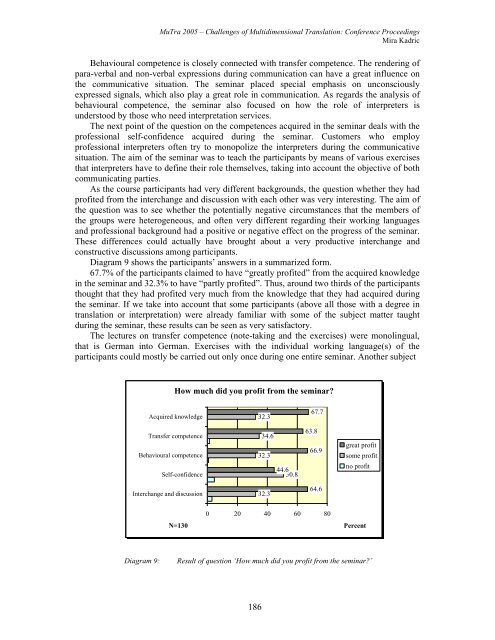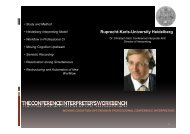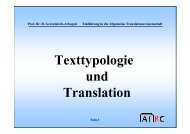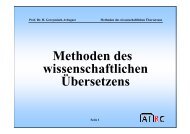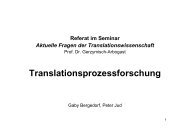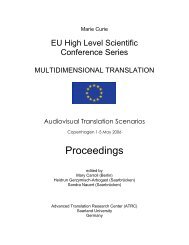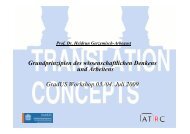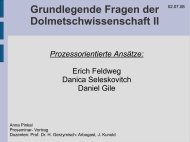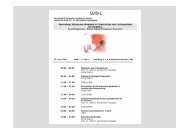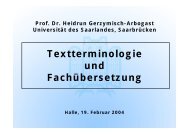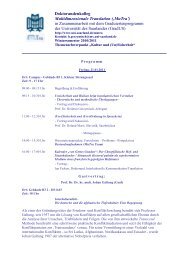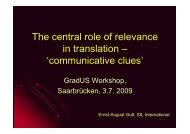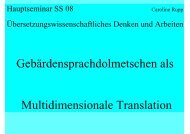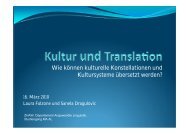Proceedings - Translation Concepts
Proceedings - Translation Concepts
Proceedings - Translation Concepts
Create successful ePaper yourself
Turn your PDF publications into a flip-book with our unique Google optimized e-Paper software.
MuTra 2005 – Challenges of Multidimensional <strong>Translation</strong>: Conference <strong>Proceedings</strong><br />
Mira Kadric<br />
Behavioural competence is closely connected with transfer competence. The rendering of<br />
para-verbal and non-verbal expressions during communication can have a great influence on<br />
the communicative situation. The seminar placed special emphasis on unconsciously<br />
expressed signals, which also play a great role in communication. As regards the analysis of<br />
behavioural competence, the seminar also focused on how the role of interpreters is<br />
understood by those who need interpretation services.<br />
The next point of the question on the competences acquired in the seminar deals with the<br />
professional self-confidence acquired during the seminar. Customers who employ<br />
professional interpreters often try to monopolize the interpreters during the communicative<br />
situation. The aim of the seminar was to teach the participants by means of various exercises<br />
that interpreters have to define their role themselves, taking into account the objective of both<br />
communicating parties.<br />
As the course participants had very different backgrounds, the question whether they had<br />
profited from the interchange and discussion with each other was very interesting. The aim of<br />
the question was to see whether the potentially negative circumstances that the members of<br />
the groups were heterogeneous, and often very different regarding their working languages<br />
and professional background had a positive or negative effect on the progress of the seminar.<br />
These differences could actually have brought about a very productive interchange and<br />
constructive discussions among participants.<br />
Diagram 9 shows the participants’ answers in a summarized form.<br />
67.7% of the participants claimed to have “greatly profited” from the acquired knowledge<br />
in the seminar and 32.3% to have “partly profited”. Thus, around two thirds of the participants<br />
thought that they had profited very much from the knowledge that they had acquired during<br />
the seminar. If we take into account that some participants (above all those with a degree in<br />
translation or interpretation) were already familiar with some of the subject matter taught<br />
during the seminar, these results can be seen as very satisfactory.<br />
The lectures on transfer competence (note-taking and the exercises) were monolingual,<br />
that is German into German. Exercises with the individual working language(s) of the<br />
participants could mostly be carried out only once during one entire seminar. Another subject<br />
How much did you profit from the seminar?<br />
Acquired knowledge<br />
32.3<br />
67.7<br />
Transfer competence<br />
Behavioural competence<br />
Self-confidence<br />
34.6<br />
32.3<br />
44.6<br />
50.8<br />
63.8<br />
66.9<br />
great profit<br />
some profit<br />
no profit<br />
Interchange and discussion<br />
32.3<br />
64.6<br />
0 20 40 60 80<br />
N=130 Percent<br />
Diagram 9:<br />
Result of question ‘How much did you profit from the seminar?’<br />
186


